



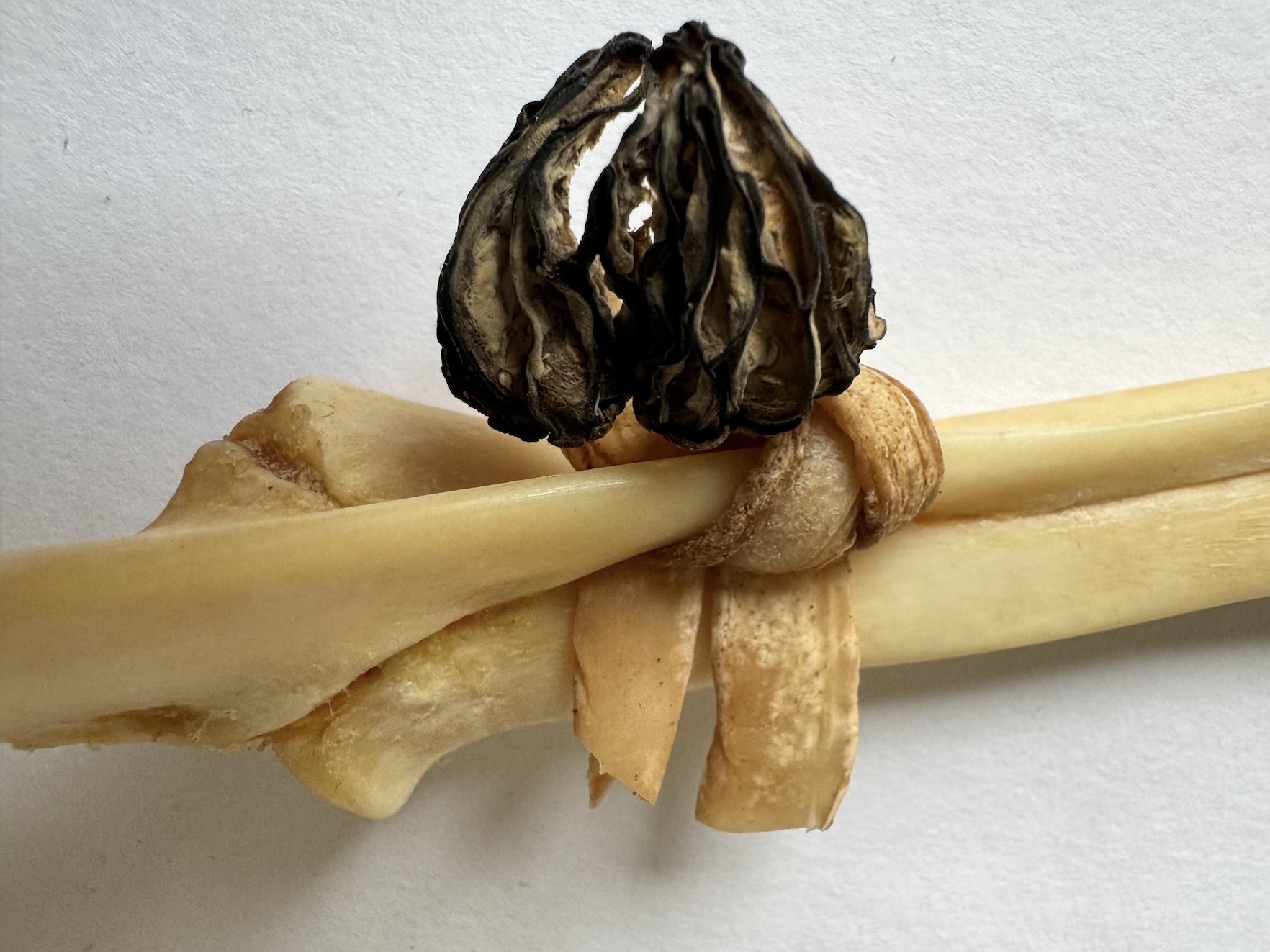
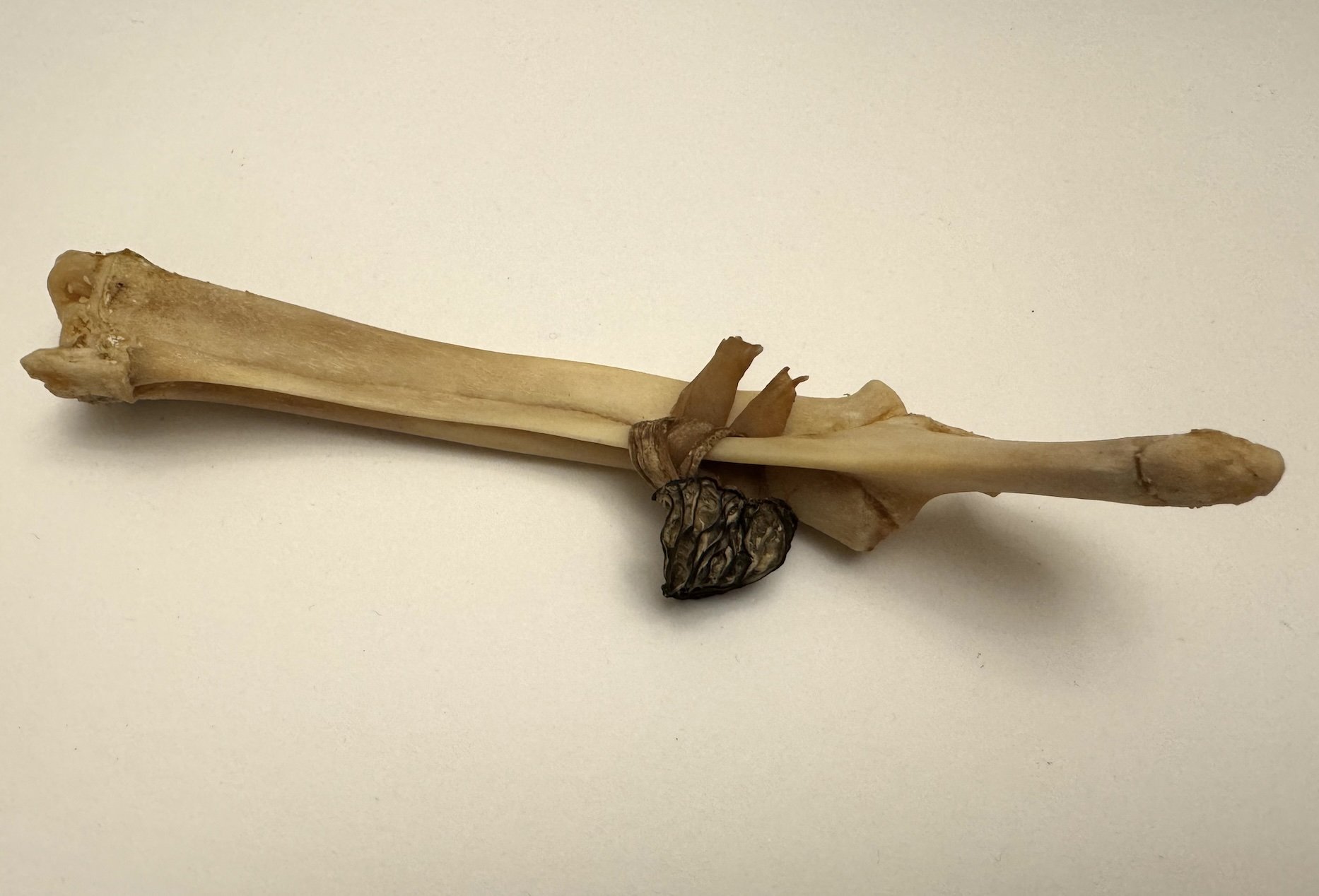


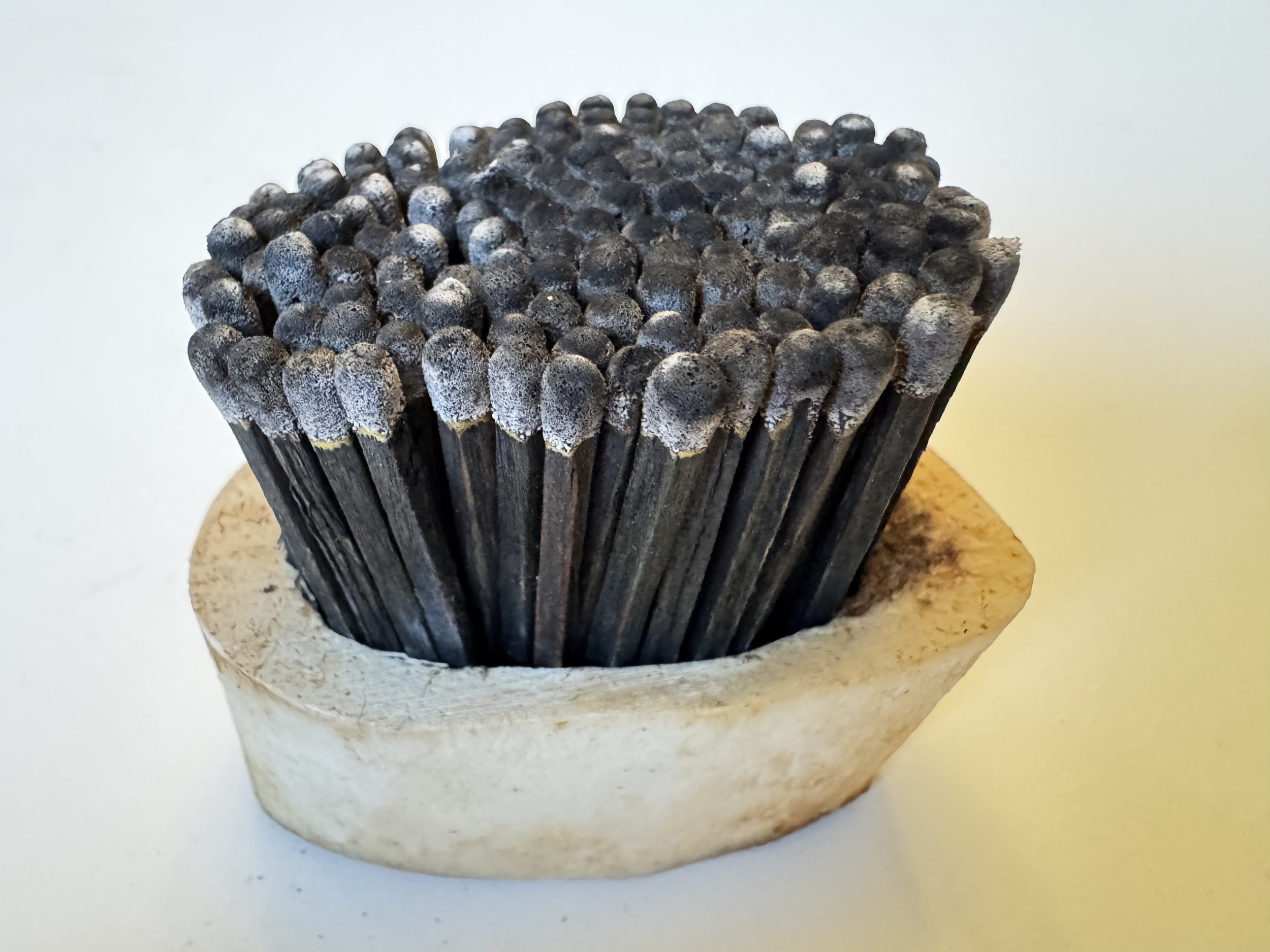
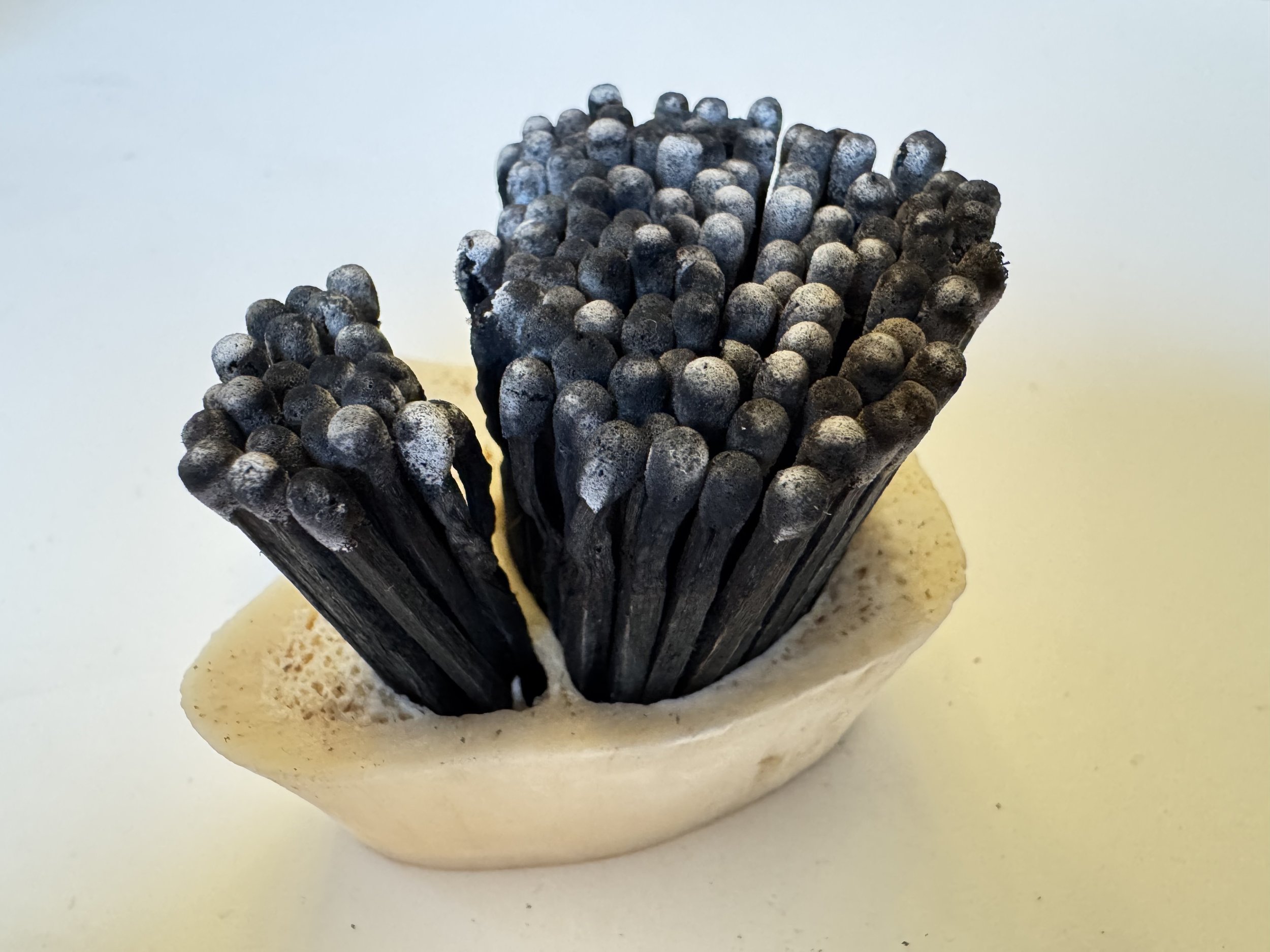
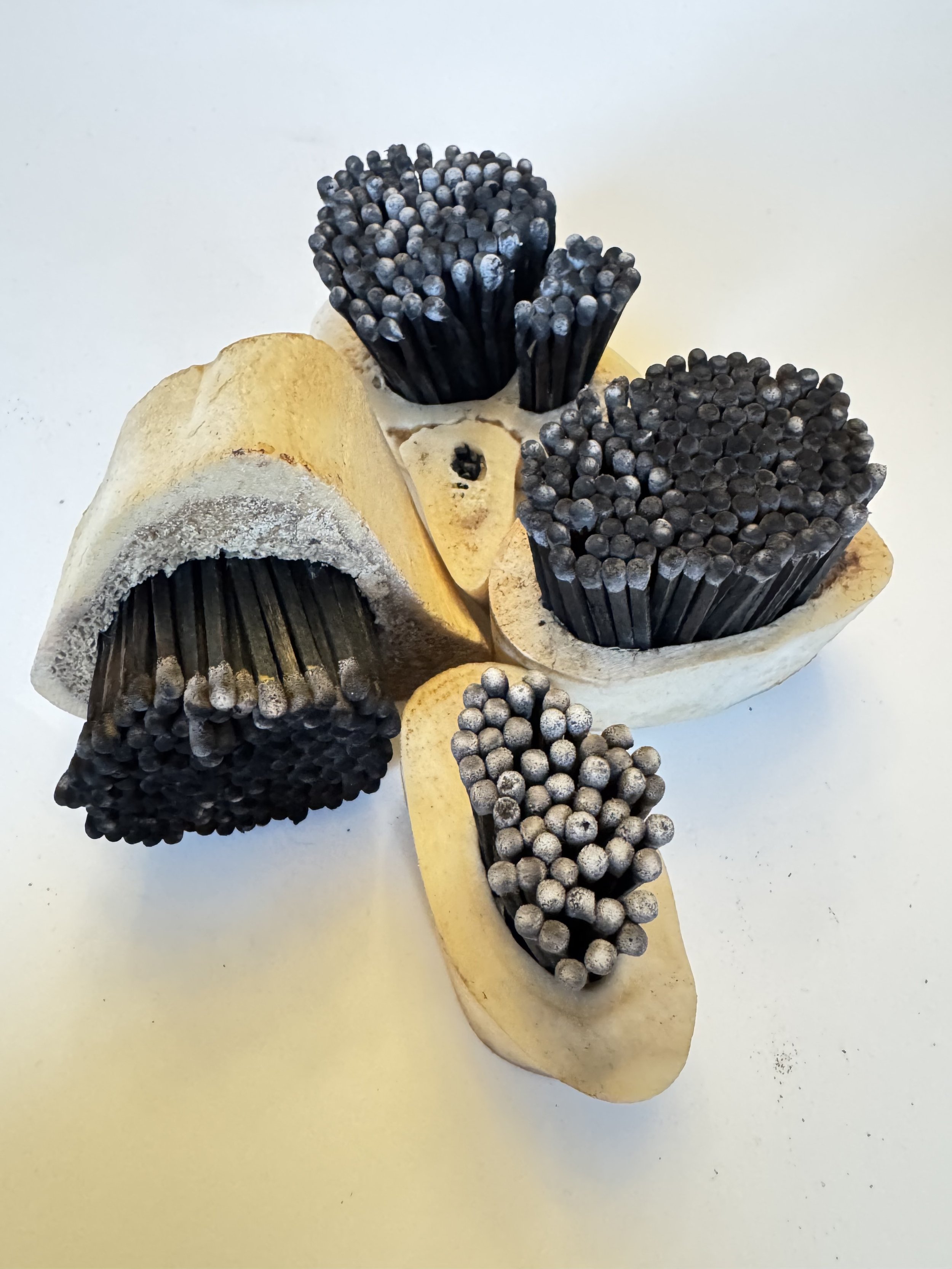



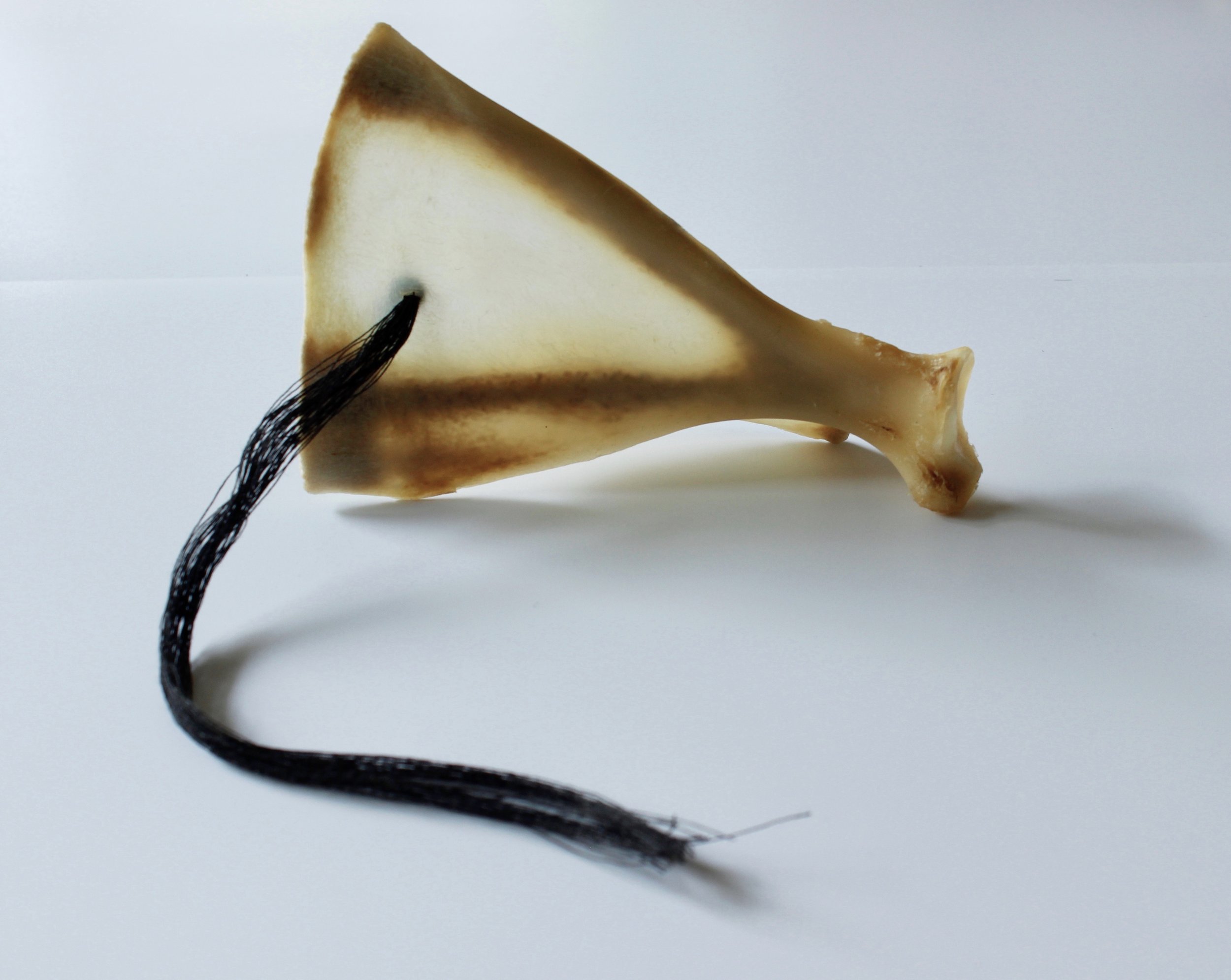





Material
Sheep bone, plastic
Information
This work using coloured plastic is a response to St Jost’s Leprosy Chapel in Trier, Germany. There has been a chapel on site since the 13th Century but the current one has stood since 1695. The money for the chapel was raised by two virgin maidens who have memorial slabs in front of the altar. There are paintings, statues, objects and stained glass, but the most precious items are bone relics. They are stored in wooden jars with windows of speculation, shaped in the gesture of Latin benediction. This work is influenced by stained glass, troubled bones, contamination and female labour reminiscent of bees.
Dimensions
H 12cm x W 7cm x D 4cm

Material
Sheep pelvis, felt, wool thread
Information
Cradle is the found pelvic bone of a sheep softened with the felted wool shorn from anonymous kin and wool thread falling like a continuous tear flow. The wool is the nearest colour to my skin in the Pantone range
Dimensions
H 63cm x W 18cm x D 8.5cm

Material
Component 1:Wishbone, artificial sponge, face powder (Boots Nº7 Light)
Component 2: Bovine bone, medical gauze, face powder (Boots Nº7 Light)
Information
The gauze was gifted to me by someone who suffered a huge loss. The bone revealed an erosion ready to hold the fragment. The tiny quail wishbone is big enough to hold hope. Face powder relays an ongoing engagement with skin and reminds me of Aunt Kathy, whom I only met only once. Aunt Kathy wore heavy face powder, even to bed, to give her light brown skin a paler hue. She escaped the family to live a life that looked and felt white. I am white, the pink felt used in the work is the closest I could find to my given skin colour. My skin colour was given to me as part of Angélica Dass project Humanae and is Pantone 68-9C.
Dimensions
Component 1: H 1.5cm x Ø5cm
Component 2: H 12.8cm x W 9cm x D 7cm

Material
Sheep bone with Half-Free Morel fungus
Information
Ephemeral sculpture exploring the poetics between a divided bone and a dissected and knotted Half-Free Morel. Divisions and halves place mathematical relationships in the realm of the philosophical. If one is divided, is one only half -free? Slow changes accompany unknown life spans.
Dimensions
H 4cm W 19cm D 2.5cm
Photo © Traci Kelly

Material
Sheep bone with Half-Free Morel fungus, 7 days
Information
Ephemeral sculpture

Material
Sea-washed bone and sea-washed memory
Information
Things washed by the sea hold the memory of the moon as planetary forces set the tides that shift and carry. Though they are picked clean and sun-bleached they hold the memory of their origin and ends. Over time they become smoother and calmer with blunted edges. The memory of the photograph is also softened, becoming mellow and vacated. The content is muted – shades of grey in chemical emulsions are quiet yet busy trying to find form as they rise and fade through light’s application. The framing is bold with borders and bone in bright tone. Border-bone — rigid, skeletal supporting the image, part of the image, holding the flesh of the image. Bone-border— dislocated, slipped and warped, a fracture of an intervention, a stitch across horizontal planes, positioned as if a cradle, a bough, a security.
The sea-washed memory is somewhere in England, whilst the sea-washed bone is from the Norwegian Sea around Lofoten, within the Arctic Circle. This is the unseen-between of balancing ecologies and personal strata, allowing work to vibrate.
Photograph: Kodak VELOX paper. This type of paper was invented by Leo Baekeland in 1893 and later sold to Kodak. It was used to make contact prints where a negative is placed on paper and exposed to light. The paper was produced until approximately 1963 — the year my mother left. Though explosive and brutal, her absence initiated a fading-out process that in bodily experience I can only describe as emulsive, where the image disappears from view into sequestered flesh, whilst the chemical layers retain unstable qualities.
Bone: Unknown, non-human origin; Norway. Over an unknown amount of time, tides and sun, the qualities of the bone come closer to unglazed porcelain. Bone without a film. Bone China. Bone ash. Bone to ashes. A father I will scatter along a grainy, sea fret softened coastline of England.
Dimensions
H 13cm x W 9cm x D 1cm

Material
Sea-washed bone, lead, flame
Information
Plumbum known as lead is allotted Nº82 in the Periodic Table. The amount of lead in the universe is gradually increasing as most heavier atoms which by nature are unstable decay into lead. The abundance of lead in the Solar System since its formation 4.5 billion years ago has increased by about 0.75%.
Sun, solar system, fire and ashes...flamed lead, my father's charring, my father's ashes. He was 82 years old. His loss weighs like lead.
Dimensions
H 12cm x W 2cm x D 1.5cm

Material
Bone, matchsticks, oxygen, friction.
Information
In process

Material
Bone, matchsticks, oxygen, friction.
Information
In process

Material
Bone, matchsticks, oxygen, friction.
Information
In process

Material
Sheep bone with catgut stitch from WW1 supplies and acrylic paint
Information
Bodily processes of expenditure, memorialisation and the poetics of materials.
Dimensions
17.5cm x 3cm x 4cm

Material
2 x bovine bones with gold-toned map pins.
Information
Bodily processes of expenditure, memorialisation and the poetics of materials.
Dimensions
Top: 4.5cm x 6.5cm x 1.3cm
Bottom: 5.7cm x 7.3cm x 3.2cm

Material
Bovine bones with catgut stitch from WWI supplies and beeswax
Information
Bodily processes of expenditure, memorialisation and the poetics of materials. Bodily productions in different species, polis as an apian repair substance.
Dimensions
3.5cm x 8.5cm x 1.5cm

Materials
Sheep bone, black thread
Information
Bodily processes of expenditure and the poetics of materials.
Dimensions
20cm x 18cm x 3cm

Materials
Ephemeral sculpture. Silicone, sea-washed bone, rubber band, jubilee clip, talcum powder.
Information
Photographic remnant
Dimensions
Variable

Material
Cuttlebone with metal grip, acupuncture needles, black thread
Information
Bodily processes and remnants and the poetics of materials.
The cuttle fish has blood with a high copper content and has three hearts to process oxygen. The acupuncture pins also have copper heads.
Dimensions
5.5cm x 6.5cm x 8cm

Materials
Proud: Cuttlebone, bovine bone syphon, imitation gold leaf with copper content
Dimensions
11cm x 5.5cm x 4.5cm
Materials
Fortified: Cuttlebone with metal grip, milk tooth
Dimensions
14cm x 6.3cm x 2.2cm
Materials
Well: Cuttlebone with metal grip, gouge and ink
Dimensions
15.5cm x 5cm x 2cm

Material
Bovine bone, rubber thimbles
Information
Bodily processes of harbouring and colonising and the poetics of materials.
Dimensions
5cm x 6cm x 1.7cm